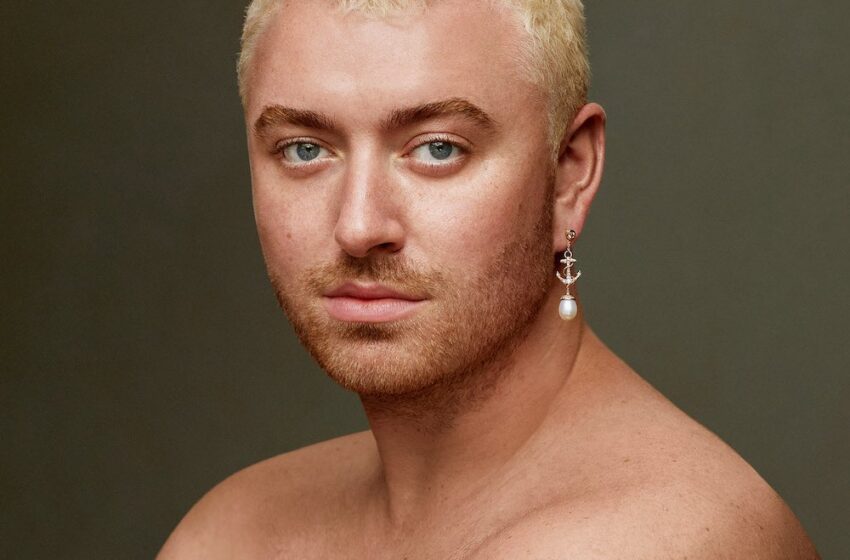
I’m Not Here to Make Friends: Sam Smith’s glorious self-expression amidst video backlash
Amidst RuPaul’s iconic call for self-love (“If you can‘t love yourself, how in the hell you gon‘ love somebody else?”), recent Grammy-winner Sam Smith glides into the night sky. Clad in gorgeous pink ruffles and riding lavishly in a golden helicopter, so begins their latest music video ‘I’m Not Here to Make Friends’.
The disco-infused track is dripping with sexual liberation and hedonistic freedom, with a New Romantics-style video and lyrics such as “If you want it bad tonight/ Come by me and drop a line/ Put your aura into mine/ Don‘t be scared if you like it.” The message is clear, we’re here to have fun, be sexy and enjoy our bodies – if you’re going to ruin the vibes, don’t come along.
Like many pop-tracks Smith’s ‘I’m Not Here to Make Friends’ invites self-loving and freedom of expression, however Smith has received a disproportionate amount of criticism for the video, with complaints centering on its hypersexualisation and supposedly loose morals. Although such criticism does come up occasionally, with tracks such as ‘WAP’, one cannot help but think that this backlash doesn’t really have anything to do with sexualised content and is, instead, a result of Smith being non-binary, plus-sized and joyously themselves.
With their most recent album Gloria, Sam Smith has entered into a new phase of musical expression, one which feels more open and liberated. The album explores their struggles with self-love – the first track ‘Love Me More’ directly addresses Smith’s challenges with body image and external criticism – whilst also reflecting the difficulties that can come with being queer. Moments such as the ‘Hurting Interlude’, a sample from lesbian activist Lilli Vincenz in the 1970s, captures the loneliness caused by heteronormativity and homophobia and locates the album within the wider LGBTQ+ movement. Amongst current discussions on and restrictions of trans rights, there is an added sense of importance to this album.
Smith’s classic sound remains, with love ballads and impressive vocals throughout, but the album also has a celebratory sound. Tracks such as ‘I’m Not Here to Make Friends’ and ‘Unholy’ explore an overtly sexual and joyous self-expression, whilst ‘Who We Love’ reflects the liberation that can come from being your true self. All-in-all, this album feels like a pure reflection of Sam Smith and their musical and personal journey over recent years.
In regards to ‘I’m Not Here to Make Friends’, the video content is not dissimilar to other mainstream pop songs – extravagant outfits, large-scale dance routines and girating bodies left, right and centre. You’ll have seen similar things in performances by Little Mix, Nicki Minaj, Madonna and countless others. Unlike these artists however, the video is unapologetically queer, filled with gorgeous, provocative and androgynous outfits, Drag Queens and ballroom style dancing. Smith looks stunning, donning multiple outfit changes as they parade amongst dancers and adoring ball-goers. It is glorious.
For critics, however, there seems to be something wrong, evident in significant backlash online. Unwanted and unneeded criticism regarding Smith’s performance, whether to do with their outfits (notably the presence of corsets and nipple tassels) or suggestive dance routines, reflects not only a continuing anger towards unapologetic queer expression, but the persistence of body-shaming and transphobia within such discourse. Smith being plus-sized and non-binary underpins much of the criticism faced online, as their choice to exercise an alluring androgyny by wearing traditionally feminine outfits, such as ballgowns, does not fit within traditional binaries. The irony is that other artists, such as Harry Styles, have been praised for such boundary-crossing and are seen as pioneers in the field. Of course, this is not really a surprise but goes to show how such explorations in fashion and self-expression are only deemed acceptable when performed by those who fit the classic pop-star moulds, and heteronormative boundaries.
Despite this, the video has also garnered positive attention and is seen by many as a wonderful production of queerness, sexuality and freedom. The video is extravagant, quirky and over-the-top in all the best ways. The song itself is also upbeat and enjoyable, reflecting excess and liberty in the age of ‘friendzoning’, dating apps and break-ups. Sam Smith’s return has been eye-catching and the ‘I’m Not Here to Make Friends’ music video is just one exuberant extension of this.
Gloria is out now on all streaming platforms.

